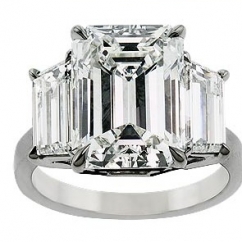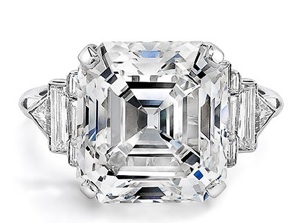Articles and News
STRONG ETHICS COST RETAIL MARGIN $$: LUXURY EXPERTS | April 11, 2012 (2 comments)

Merrick, NY—Do luxury consumers care where their diamond comes from? More importantly, are they willing to pay more for an ethical-source pedigree?
Luxury experts say they do care, but they won't pay--which means retailers may not be able to charge a premium for such stones and may have to absorb that cost themselves.
Acknowledging that a socially responsible product--whether a diamond or organic, free-range eggs--will almost always cost more, Milton Pedraza, president of the Luxury Institute, says that asking luxury consumers if social responsibility is important to them is like asking if they love their mother. Of course they do. And if it’s the same price, of course they’ll opt in. But when does the added cost put on the brakes?
“2007 was an ideal time to be idealistic. Money was flowing and people routinely said, ‘Sure, I’ll pay more [for socially-responsible goods]. But once the recession hit and money dried up, we’re not so sure,” Pedraza told The Centurion. Even though luxury has come back in 2010 and 2011 as the economy recovers, he’s still not sure consumers are ready to pay extra for a social guarantee. (The Luxury Institute will be conducting a new survey of affluent consumers this year, measuring any change in attitudes about socially responsible shopping since 2007. The Centurion will report the findings.)
Andrea Hansen, CEO of Ivanka Trump Fine Jewelry, says they’re not. Hansen recently spoke as part of a Women’s Jewelry Association panel discussion on the topic, and The Centurion caught up with her after the event.
“Whether I am selling to the final customer at our retail boutiques, or speaking to our retail accounts, there is great resistance to a price premium,” she said. Responsible sourcing is a key component of Ivanka Trump’s bridal jewelry line, which is comprised of Canadian diamonds and recycled metals, but Hansen says the company absorbs the cost of ethical sourcing rather than pass it along to consumers.
“Amongst [our] retailers, there’s great skepticism that their clients will tolerate a higher price. Remember, there are hundreds of bridal jewelry manufacturers and price comparison is easy,” she told The Centurion.
Among customers coming into the boutiques, Hansen says virtually none begin with questions about sourcing. They’ll often ask where the diamond comes from, but it’s after they’ve found a style they like and that suits their budget, she says.

An Asscher-cut diamond ring set in platinum, with mixed diamond band, from the Ivanka Trump Bridal Collection.
But even if cost isn’t an issue for luxury consumers, complexity can be, Pedraza told The Centurion. This is an educated consumer that knows sometimes ethical sourcing is just a choice of the lesser evil.
Which is better, plastic or paper? Plastic isn’t biodegradable and who knows what it off-gasses in the landfill. But paper means cutting down trees, and forests are important, not to mention the environmental issues surrounding paper mills.
So, you argue, put your purchases in a reusable canvas bag. But the textile industry is one of the biggest sources of pollution in the world, so is it really a better choice?
Pedraza also points out an unfortunate fine line between improving lives and removing livelihood. Yes, labor conditions in some places are terrible—but what about if the only alternative is no job at all? Not that it makes poor labor conditions right, but it makes the choice more difficult.
This commentary in National Jeweler raises an interesting point: the author, Michelle Graff, writes that she prefers to buy only organic food. But she acknowledges that she’s single in New York City, her food budget has to feed one, and her choices might be different if she had a family of four to feed and lived somewhere that didn’t put such an emphasis on organic food.
How does Graff’s dilemma translate to luxury jewelry, where the difference isn’t the extra $2.00 it costs for a carton of organic, free-range eggs, but rather a price premium that could add another $1,000 or more to a diamond that’s already $10,000? Does even a conscientious luxury customer have a tipping point where the wallet wins over conscience?
At the Women’s Jewelry Association event, Charles Stanley, CEO of Forevermark USA, said he believes the time is coming when all consumers will care about a product’s origins, but Hansen thinks that time is still a ways off.
“Perhaps in a couple of years and on more solid economic grounds,” she says.







